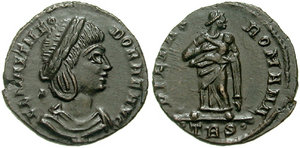.gif)
Pietas (goddess)
Encyclopedia

Roman mythology
Roman mythology is the body of traditional stories pertaining to ancient Rome's legendary origins and religious system, as represented in the literature and visual arts of the Romans...
, Pietas was the goddess of duty
Duty
Duty is a term that conveys a sense of moral commitment to someone or something. The moral commitment is the sort that results in action and it is not a matter of passive feeling or mere recognition...
to one's state
Sovereign state
A sovereign state, or simply, state, is a state with a defined territory on which it exercises internal and external sovereignty, a permanent population, a government, and the capacity to enter into relations with other sovereign states. It is also normally understood to be a state which is neither...
, gods
Deity
A deity is a recognized preternatural or supernatural immortal being, who may be thought of as holy, divine, or sacred, held in high regard, and respected by believers....
and family
Family
In human context, a family is a group of people affiliated by consanguinity, affinity, or co-residence. In most societies it is the principal institution for the socialization of children...
and a personification of the Roman virtue of pietas. One of the di indigetes
Di indigetes
In Georg Wissowa's terminology the di indigetes or indigites were Roman deities and spirits not adopted from other mythologies, as distinguished from the di novensides...
, her main temple was a 2nd century BC one in the Forum Holitorium.
This goddess was often depicted on the reverses of Roman Imperial coins with women of the imperial family on the obverse , as an appropriate virtue to be attributed to them (e.g. Flavia Maximiana Theodora
Flavia Maximiana Theodora
Flavia Maximiana Theodora was the stepdaughter of Maximian. Her parents were Flavius Afranius Hannibalianus and wife, divorced before 283, Eutropia, later wife of Maximian. Theodora's father was consul in 292, and praetorian prefect under Diocletian...
, right). The imperial women might even appear in the goddess's guise (e.g. Livia
Livia
Livia Drusilla, , after her formal adoption into the Julian family in AD 14 also known as Julia Augusta, was a Roman empress as the third wife of the Emperor Augustus and his adviser...
here and Salonina Matidia
Salonina Matidia
Salonina Matidia was the daughter and only child of Ulpia Marciana and wealthy praetor Gaius Salonius Matidius Patruinus. Her maternal uncle was the Roman emperor Trajan. Trajan had no children and treated her like his daughter...
here).

